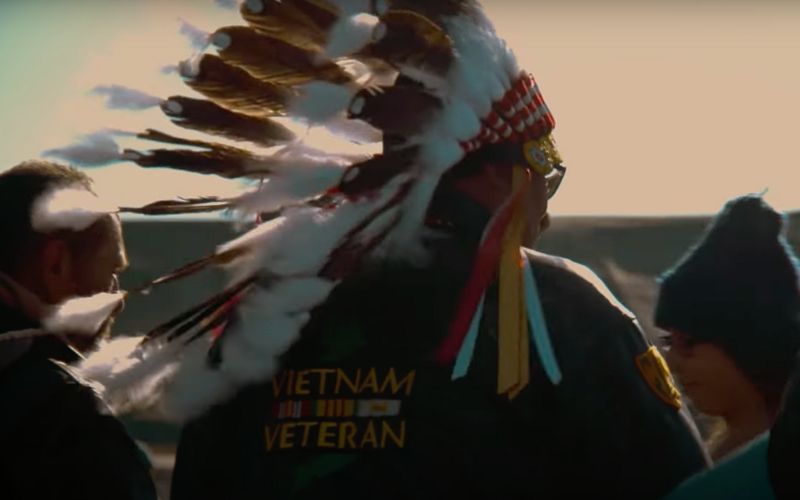
- Details
- By Native News Online Staff
The National American Indian Veterans (NAIV) organization will receive a congressional charter, marking the first Native American-dedicated group and the first veterans group to receive a charter in 15 years.
The charter was included in 2024 the National Defense Authorization and allows the organization to testify about veterans issues before Congress. It allows accreditation of NAIV members by the Department of Veterans Affairs to assist veterans and their families with benefit claims.
According to the Department of Veterans Affairs, charters — or laws passed by Congress that stipulate the mission, authority and activities of a group — have been granted to other nationalities and religious groups, but no Native American veterans organizations have received one. There are more than 140,000 Native Veterans in the United States, and advocates say a Native American charter is long overdue.
“We as veterans have been asking for this charter since 2004,” said Robert Dunsmore, Cheyenne River Sioux Tribe Veterans Service Officer, in a press release. “We, as American Indian veterans, hopefully will have a voice on matters that pertain to American Indian veterans.”
Originally established in 2004 on the Cheyenne River Sioux Tribal Reservation, NAIV originated from a 91-year-old Korean War veteran, Don Laudner, who focused on providing more representation for Native American veterans in their pursuit of VA benefits.
“It is a great honor to Headquarter the National American Indian Veterans on the Cheyenne River Sioux Tribe, and serve the needs of our brave Native American Veterans across the nation,” said Ryman LeBeau, Chairman of the Cheyenne River Sioux Tribe, in a press release. “We honor the sacrifices made by our ancestors before us, and our warriors – the Veterans who unwaveringly answer the call to stand up to protect the people and our future generations,”
American Indians and Alaska Natives serve in the U.S. Armed Services at a higher rate and are less likely to have health insurance or a service-connected to disability compared to other veterans, according to the Veterans Health Administration.
“We owe a great debt to Native American veterans for their service and sacrifice. I’m glad Congress is finally recognizing their service with a Congressional Charter. The NAIV is a critical resource that delivers assistance, and securing this charter ensures that Native veterans can access the benefits they have rightfully earned.” said New Mexico Senator Ben Ray Luján in a press release.
NAIV, endorsed by the National Congress of American Indians and other tribal and veterans organizations, now joins alongside other prominent veterans service organizations like the American Legion, Veterans of Foreign Wars, and Disabled American Veterans.
Joey Strickland, a retired colonel of Choctaw descent and NAIV’s chief of staff, told Military Times the group is looking to include better organization efforts, as well as grow its membership to represent a broader Indigenous community.
“We’re excited, but we now realize the hard work has to start,” Strickland said. “There’s just a lot of work that needs to be done.”
More Stories Like This
Native News Weekly (August 25, 2024): D.C. BriefsCheyenne River Youth Project to Celebrate Women’s Strength at Barbie-Themed Passion for Fashion on March 14
Celebrating Native American Women
Native Bidaské: The Illusion of Freedom and the Myth of America 250, Leonard Peltier Speaks Out
Monday Morning (March 2, 2026): Articles You May Have Missed This Past Weekend
Help us defend tribal sovereignty.
At Native News Online, our mission is rooted in telling the stories that strengthen sovereignty and uplift Indigenous voices — not just at year’s end, but every single day.
Because of your generosity last year, we were able to keep our reporters on the ground in tribal communities, at national gatherings and in the halls of Congress — covering the issues that matter most to Indian Country: sovereignty, culture, education, health and economic opportunity.
That support sustained us through a tough year in 2025. Now, as we look to the year ahead, we need your help right now to ensure warrior journalism remains strong — reporting that defends tribal sovereignty, amplifies Native truth, and holds power accountable.
 The stakes couldn't be higher. Your support keeps Native voices heard, Native stories told and Native sovereignty defended.
The stakes couldn't be higher. Your support keeps Native voices heard, Native stories told and Native sovereignty defended.
Stand with Warrior Journalism today.
Levi Rickert (Potawatomi), Editor & Publisher


